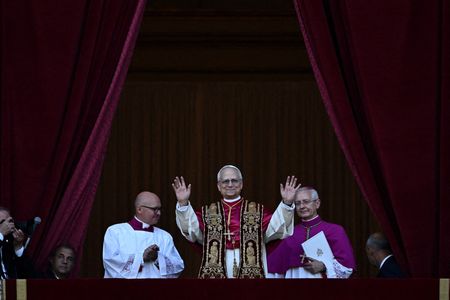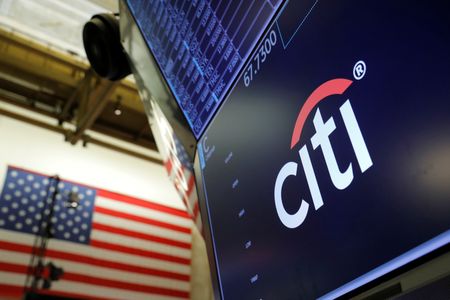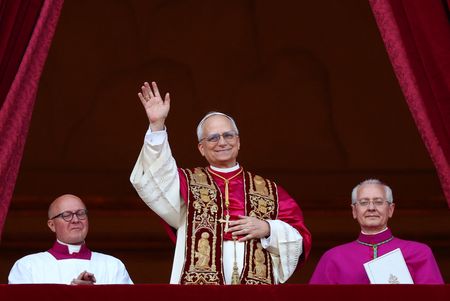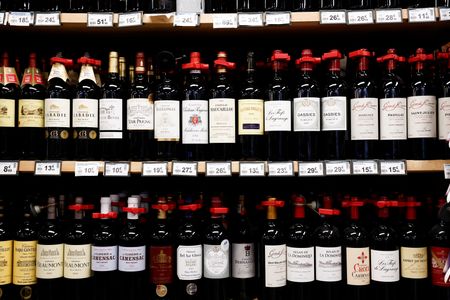By Alistair Smout, Andrew MacAskill and Andrea Shalal
LONDON/WASHINGTON (Reuters) -U.S. President Donald Trump and British Prime Minister Keir Starmer on Thursday announced a “breakthrough deal” on trade that leaves in place a 10% tariff on goods imported from the UK while Britain agreed to lower its tariffs to 1.8% from 5.1% and provide greater access to U.S. goods.
The agreement announced by Trump from the Oval Office marked the first since Trump triggered a global trade war with a barrage of levies on trading partners following his return to the White House in January.
“It opens up a tremendous market for us,” Trump said.
“This is a really fantastic, historic day,” Starmer said by teleconference.
The United States has been under pressure from investors to strike deals to de-escalate its tariff war after Trump’s often chaotic policymaking upended global trade with friends and foe alike, threatening to stoke inflation and start a recession.
Top U.S. officials have engaged in a flurry of meetings with trading partners since the president on April 2 imposed a 10% tariff on most countries, along with higher rates for many trading partners that were then suspended for 90 days.
The U.S. has also imposed 25% tariffs on autos, steel and aluminium, 25% tariffs on Canada and Mexico, and 145% tariffs on China. U.S. and Chinese officials are due to hold talks in Switzerland on Saturday.
WARM RELATIONSHIP
With the British economy struggling to grow, the tariffs had added to the pressure on his government.
Jaguar Land Rover paused its shipments to the U.S. for a month and the government was forced to seize control of British Steel to keep it operating.
The deal will reduce U.S. tariffs on British auto imports to 10% from the current 27.5% according to a UK statement. The lower rate will apply to a quota of 100,000 British vehicles, almost the total exported to the U.S. last year.
U.S. tariffs on imports from the struggling UK steel industry will fall to zero from 25%, while British tariffs on U.S. ethanol will fall to zero from 19%.
Both sides have agreed new reciprocal market access on beef – with UK farmers given a tariff-free quota for 13,000 metric tonnes. There will be no weakening of UK food standards on imports.
Commerce Secretary Howard Lutnick said that Britain is expected to announce a purchase of $10 billion worth of U.S.-assembled Boeing aircraft, although a White House graphic referred to “aircraft parts.” In turn, Lutnick said that the U.S. will allow duty-free imports fo Rolls-Royce RR.L jet engines.
Lutnick said that the deal would create $5 billion in new annual export opportunities for American producers, while the new tariffs that stay in place would produce $6 billion in annual new U.S. revenue.
While seeking a deal with the U.S., Britain had refused to lower its food standards, which are closely aligned with the European Union. However, Britain’s farming trade union has said that some U.S. producers who do not use growth hormones or antimicrobial washes could be given greater market access.
Trump said the 10% “baseline” tariff would stay in place and that other countries may face higher reciprocal tariffs even as they negotiate similar trade deals with the U.S.
Details were scant on tariffs on UK pharmaceuticals imports, which could damage AstraZeneca and GSK, although a White House fact sheet said the deal would create a secure pharma supply chain.
Initial news of an announcement sent shares in luxury carmaker Aston Martin up 10%, while British retailers with operations in the U.S., including JD Sports and Primark owner AB Foods, also rose.
TRADE TIGHTROPE
Starmer’s government has been seeking to build new trading relationships post-Brexit with the U.S., China and the EU without moving so far towards one bloc that it angers the others.
Economists and one FTSE 100 chief executive said the immediate economic impact of a tariff deal was likely to be limited but that trade agreements in general would help long-term growth. Britain struck a free trade agreement with India this week.
There are also domestic political risks.
Polling shows the government remains deeply unpopular, making any move to cut taxes on multi-national tech companies a big risk.
Britain’s digital service tax, levied at 2% of UK revenue for online marketplaces, would continue unchanged.
It was expected to raise about 800 million pounds ($1.1 billion) this year, but companies such as Google and Amazon have passed the cost on to customers through ad surcharges and higher selling fees, respectively.
“The American, Indian and other deals we can do will be really important to the long-term economic health of the UK but don’t expect them to result in overnight euphoria,” the CEO said, speaking on condition of anonymity.
(Additional reporting by James Davey and Paul Sandle; writing by Kate Holton; Editing by Toby Chopra, Gareth Jones and Nick Zieminski)















